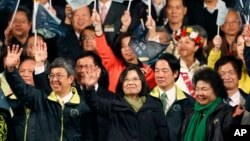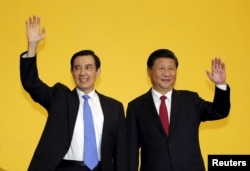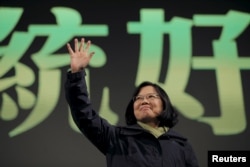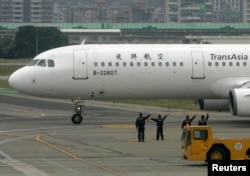As Taipei’s president-elect prepares to take office in May, ever tense but recently improved relations between China and Taiwan appear headed into a new slump, with the two sides unable to agree on how to hold talks that would build trust and allow the signing of agreements.
If China and Taiwan avoid each other after Tsai Ing-wen becomes president, they will effectively suspend regular negotiations that have led to growth in trade and tourism, analysts say.
China may retaliate
Agreements signed since 2008 have supported Taiwan’s now struggling export-driven economy. China may also follow existing deals less rigorously, and some believe it is now holding back tourists.
Taiwan and China have been political rivals since the 1940s. The two Asian neighbors are self-ruled, but China claims sovereignty over Taiwan and insists that it be brought under its control as a finale to the Chinese civil war of the 1940s. Surveys show that most Taiwanese prefer today’s status quo.
Current President Ma Ying-jeou opened talks with Beijing after he was elected in 2008. Each side agreed then to see the other as China, just subject to different interpretations, in line with the 1992 consensus.
New president not keen on dialogue with Beijing
But voters felt President Ma had grown too close to Beijing after signing 23 agreements. In January they elected Tsai, who will take office May 20. She rejects Ma’s basis for dialogue with China, despite Beijing’s call this month for her to uphold it. Her party prefers to treat China as a separate country.
“There won’t be any new economic agreements or people-to-people exchanges anytime soon after Tsai comes into office,” said Sean King, senior vice president with the consulting firm Park Strategies in New York and Taipei.
“I also won’t be surprised if Beijing cuts back on tourists to Taiwan, an economic punishment as it were, to express its displeasure with Tsai’s refusal to recognize the 1992 consensus,” he said.
The current government reached deals with China to open tourism, smooth investment and cut import tariffs, a particular boon to Taiwan as China is its number one trade partner by value of goods. The two sides have met formally at least twice a year since 2008 to sign those accords and lack other channels to make deals.
A trade-in-goods pact is still being negotiated, and Taiwan legislators have not ratified a service trade liberalization agreement signed in 2013.
Travel applications down
In a possible sign of resistance from Beijing, travel applications from mainland Chinese have fallen 1.4 percent in the first nine weeks of 2016 compared to the same period of last year, said Jeff Yang, secretary general of Taiwan’s China policymaking body, the Mainland Affairs Council.
Travel agents say arrivals began declining before the election of Tsai on Jan. 16.
But Yang said his agency lacks evidence to prove that China is taking measures to resist the change in president.
“We have a lot of channels to seek this information and ways to demand a statement from the other side,” Yang said. “But we can’t see any actual evidence or boldly suppose that this kind of thing has happened. We could roughly theorize, but after all we need to be careful in seeking verification.”
A drop in tourists from a 2015 peak of 3.4 million arrivals would threaten Taiwan’s service sector. It might also empty some of the direct commercial flights that emerged after 2008, said Raymond Wu, managing director of Taipei-based political risk consultancy e-telligence.
There are now about 890 direct flights per week between the mainland and Taiwan, up from virtually none before Ma took office.
Pressure on Beijing
“The president-elect’s rejection of today’s dialogue conditions without new ones that China accepts will put Beijing in a tough spot,” Wu said. “China hopes to charm Taiwan’s people as a gambit toward its goal of peaceful unification.
“This is going to be a dilemma for Beijing,” Wu said. “If Beijing does all these things, of course there will be resentment from Taiwan. This would be going against what Beijing has said all along, that they’re resting their hopes on the people of Taiwan. But if they don’t do anything at all then they will be viewed as a paper tiger.”
Tsai’s government has said it would uphold the agreements reached under President Ma.
In response to Beijing’s calls for accepting the 1992 Consensus, Tsai’s Democratic Progressive Party (DPP), which has never recognized the deal, this month called for the peaceful development of relations.
When the new government takes office, the party said it will "maintain the status quo" and “do its utmost to ensure peace and stability."







